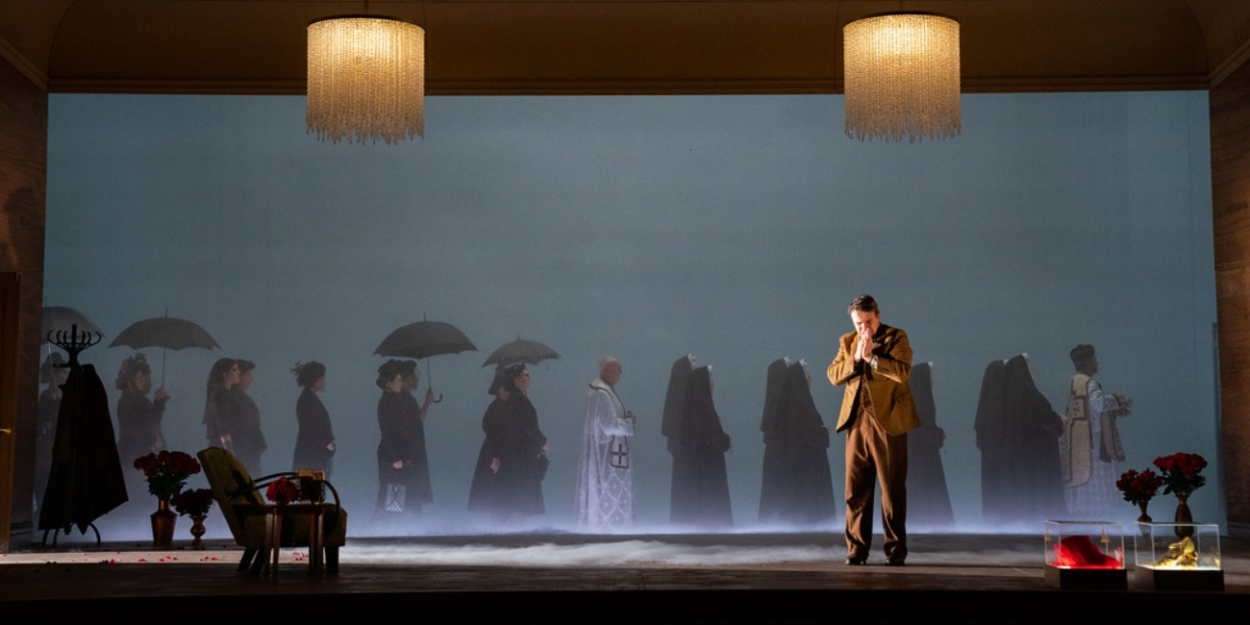Review: THE DEAD CITY (DIE TOTE STADT), London Coliseum
An arresting new production of Korngold's operatic meditation on melancholy


Love triangles are familiar territory for opera goers. But Korngold's The Dead City (Die Tode Stadt) has a tragic twist on the trope in that one of the lovers trapped in the triangle is dead. Written in 1920 and criminally underperformed, this is the opera's third professional production in the UK. The Dead City is a psychosexual odyssey whose post-war meditations on death and loss will no doubt reverberate across generations.
Peel away the layers, just as Artistic Director of the ENO Annilese Miskimmon does with her new production, and you will find a thrillingly modern murky moral core. The Dead City is not just an eviscerating deep dive into the psychology of grief, but a psychological unravelling of masculine fragility, thematically ahead of its time.
Paul, enslaved by grief from the death of his wife Marie, masks his suffering with delusion. Initially he is in total control of his hermitic life camped up in an art deco flat surrounded by artefacts of his grief. Marie's dress and hair are locked in glass cabinets trapped in a shrine-like statis, he dons white gloves to handle them, a heart-wrenching suggestion of Howard Hughes-like obsessive compulsive disorder.
His grief doesn't stay masked for long. Soon his world cascades into a Freudian dreamscape upon a chance encounter with Marie's doppelganger, the seductive and curiously named Marietta. The stage morphs into a cross section of his fracturing mind. The back wall rises eerily divulging ghostly masked figures from Paul's memories, the lines between reality, dream, and memory uncannily obscured.
For all the deeply elegiac depths Korngold's opera reaches, one can only imagine the tragic resonance with a post-war ravaged Europe. The music is jaunty and animated, shimmering with lightness, emphasised with brisk vivacity from conductor Kirill Karabits. But heavier tones and throbbing percussion linger beneath the jubilation, an eerie testament to the difficulty of breaking free from the shackles of grief.
Does Paul relinquish his trauma or just mask it with quixotic delusion? Miskimmon parallels the oxymoronic tension woven into Korngold's score with dextrous direction. Swiss tenor Rolf Romei's physicality is mercurial and increasingly explosive but recovering from illness he takes time to find his feet. Allison Oakes's Marietta on the other hand is an effervescent dynamo who energises Romei with her powerful vocals, a stalwart declaration of her independence and resistance to Paul's domineering yet unstable masculinity.
Their moral and sexual interplay becomes an urgent provocation as Paul treads the fine moral line of victimhood and oppressor. He may be devastated by guilt in betraying his lover, but is he justified in weaponising his grief as abuse towards Marietta?
For all the opera's melancholic meditation, the question at the core of this production feels pressingly contemporary, grabbing the audience by the neck and demanding a response.
The Dead City (Die Tote Stadt) plays at the London Coliseum until 8 April
Photo Credit: Helen Murray
Reader Reviews

Videos

